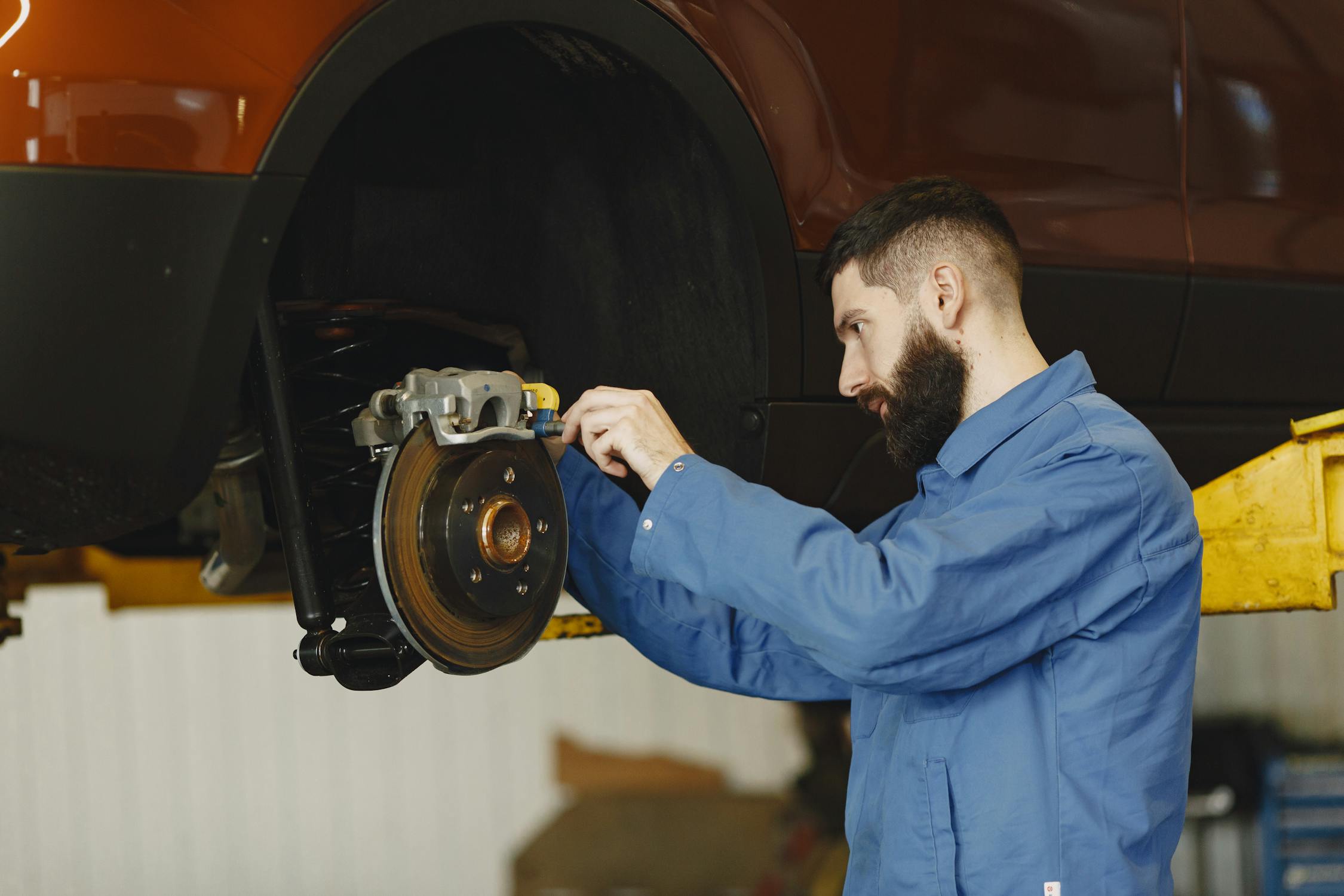You use your brakes for daily driving to work, school, or leisure travel on road trips through North Texas. But you may not know what to look for as a sign your brakes need replacing. Individual components in your car’s braking system work together to provide you with responsive stopping power.
Take the brake rotors, for example. These discs play a vital part in stopping your car, and when they go bad, the signs are noticeable. So, what signs should you look for? What do brake rotors even do? Find the answers to these questions and more with this guide.
What Are Brake Rotors?

A brake rotor is a steel or carbon-ceramic disc connected to your car’s axle. A brake pad clamps onto the brake rotor to provide friction and stopping power to the braking system. When you apply the brakes using the brake pedal, the pressure mechanically or electronically forces the brake pads to close onto the brake rotor, reducing the vehicle’s speed to a complete stop.
Signs You Need New Brake Rotors
When the brake rotors go bad, your reliable stopping performance is compromised. Keep an eye — and an ear — out for the following tell-tale signs you need new rotors.
Steering Wheel and Brake Pedal Vibration
Braking should be effortless from when you push down on the brake pedal to when you stop. If your brake pedal vibrates when you press your foot down on it, or your steering wheel vibrates, this indicates an issue with your brakes. A buildup of brake pad deposits caused by ill-fitting pads or uneven clamping causes your braking system to vibrate when you use it. Check your brakes as soon as you notice this pulsation to avoid more damage.
Longer Stopping Times
New brake rotors help your car stop quickly and in a short distance. Over time, the surface wears down, reducing your car’s reliable stopping power. If it takes too long for your car to come to a full stop when you apply the brakes, your brake rotors likely need replacing. Rather than worrying you won’t stop in time to avoid an accident, see a service technician about the brake issue as soon as possible.
Loud Grinding Noise When Braking
Corrosion is the culprit of the awful grinding noise coming from your brakes. When the braking system corrodes, the individual components grind against each other. Another sound indicator you might hear when you brake is a squealing sound. This occurs when the brake pads are worn thin and rub against the rotors. Regardless of the noise source, have a certified mechanic inspect your brakes to determine the cause and replace parts as needed.
Visible Grooves and Cracks on the Rotor
Look through your vehicle’s wheels and locate the brake rotors. The surface of the rotors should be even and free of cracks and bumps. Cracks develop on the brake rotor’s surface because brakes are in constant contact with heavy heat from brake pressure. This indicator can worsen if you often experience stop-and-go traffic in your Dallas-Fort Worth area commute.
Grooves or bumps on your brake rotors are another indication they need replacing. The brake pads have nothing to grip without a smooth brake rotor surface. If you notice these blemishes, contact a brake professional to assess the damage and replace the brake rotors. If you ignore these issues, you risk losing stopping power and the ability to mitigate collisions.
How Often Should You Replace Brake Rotors?
Standard steel brake rotors should last between 50,000 to 80,000 miles, with a recommended inspection around 70,000 miles if no brake issues have occurred. Carbon-ceramic discs last longer than steel at over 100,000 miles. If you need help determining what type of brake rotors you have, ask a certified brake professional. Get your next brake service from our qualified automotive technicians at Huffines Hyundai Plano. They’re backed by years of experience and factory training to inspect and replace your brakes.
Additional Brake Services
There’s more to your car’s brake system than just the rotors. Brake pads and brake fluid are equally vital to making your vehicle stop. Consider these components and their required servicing to ensure your brakes continue working when you need them to.
Brake Fluid Flush and Replacement
One of your auto’s six fluids that should be checked routinely is brake fluid. Brake fluid helps provide the force your car needs to fully stop. If there’s a leak or the brake fluid is contaminated with dirt, you’ll have issues with your brakes. Ask a qualified service technician to check your brake fluid level and condition. If there’s a leak, the service tech will replace the broken parts before replenishing the fluid. They will flush the fluid out before refilling it if it’s contaminated.
Brake Pad Replacement
Just like your brake rotors, the brake pads wear down over time. Brake pads have a built-in wear indicator that screeches when their thickness is below ideal, typically under a quarter of an inch. If the pads wear below the minimum thickness of an eighth of an inch, you risk total brake failure. Get your brake pads inspected as soon as you notice this squealing sound to prevent further damage.
Do your brakes need replacing? Trust a qualified brake professional to ensure proper installation. If they’re not correctly installed, your car’s ability to stop quickly and reliably is compromised.
Schedule a Brake Service at Huffines Hyundai Plano
Is it time to replace your brake rotors? Do you need a brake inspection in Plano? Our Huffines Hyundai Plano service center at 909 Coit Road proudly serves the Dallas-Fort Worth area. Residents and visitors can book a brake service with our expert auto technicians. We understand you may be busy, so we offer convenient service hours to accommodate your schedule. We’re open Monday through Friday from 7 a.m. to 7 p.m. and Saturday from 8 a.m. to 5 p.m. If you’re on a budget and need to save money, ask about our available service specials.
